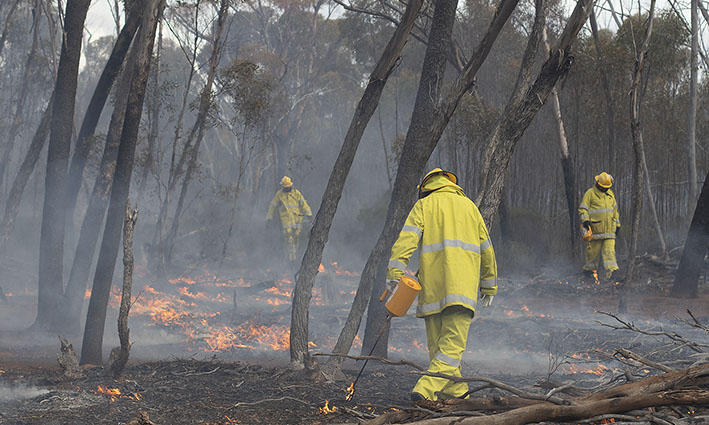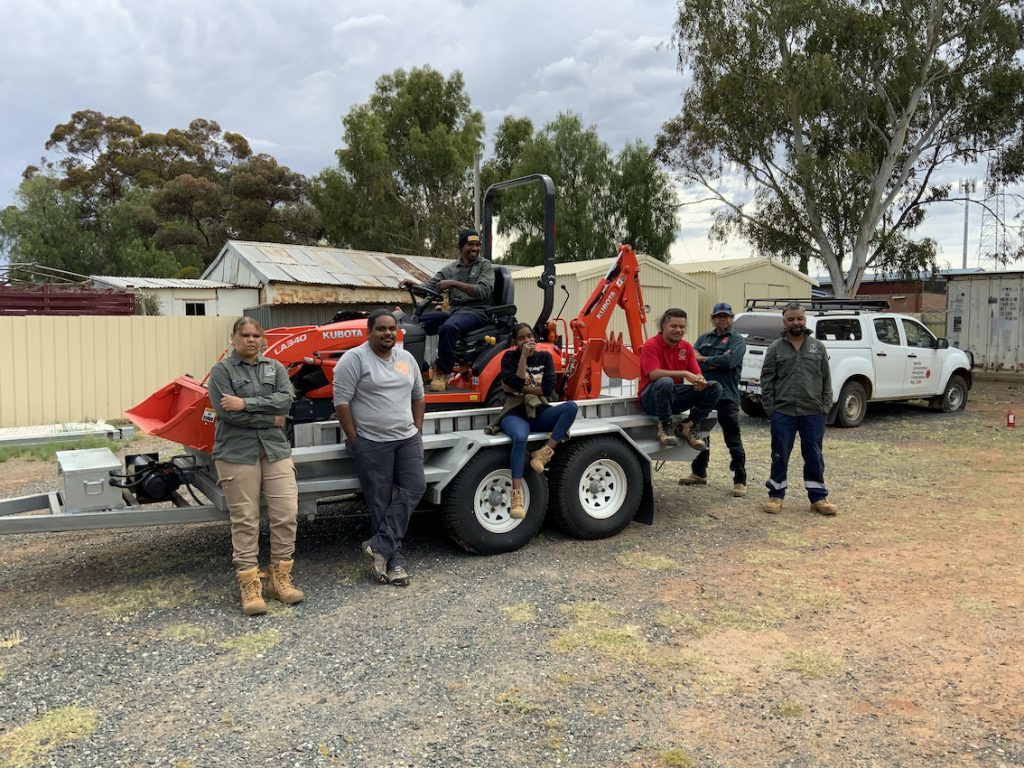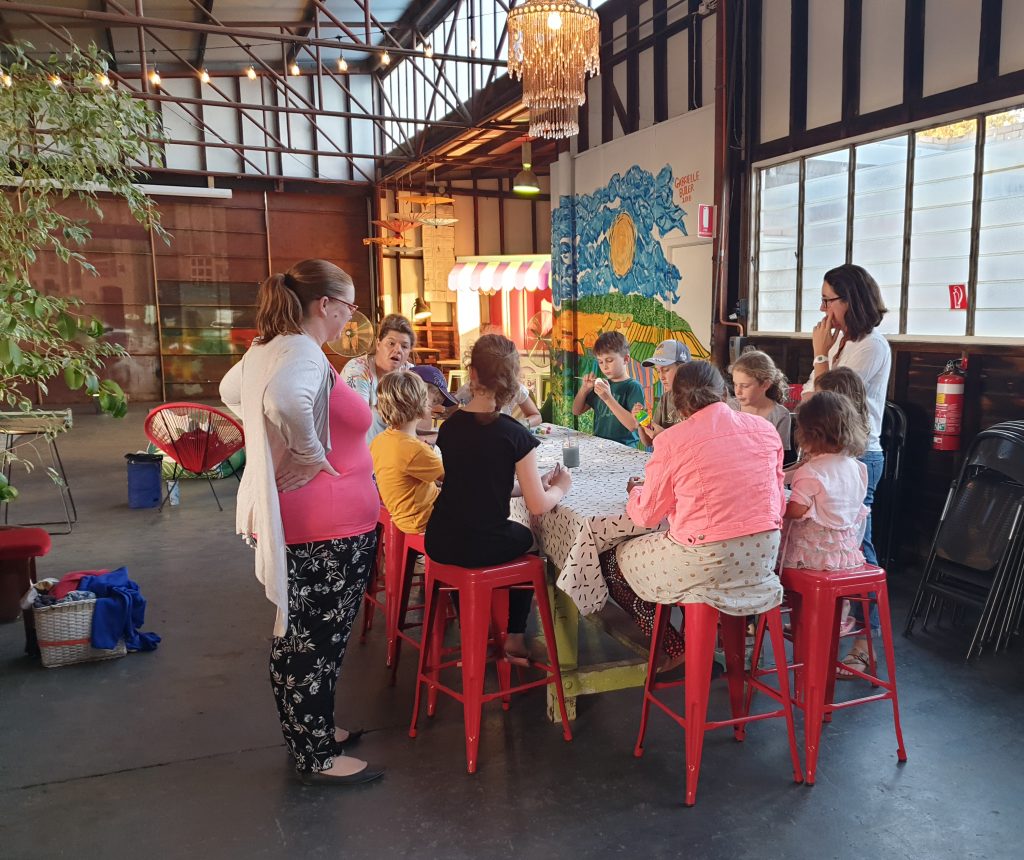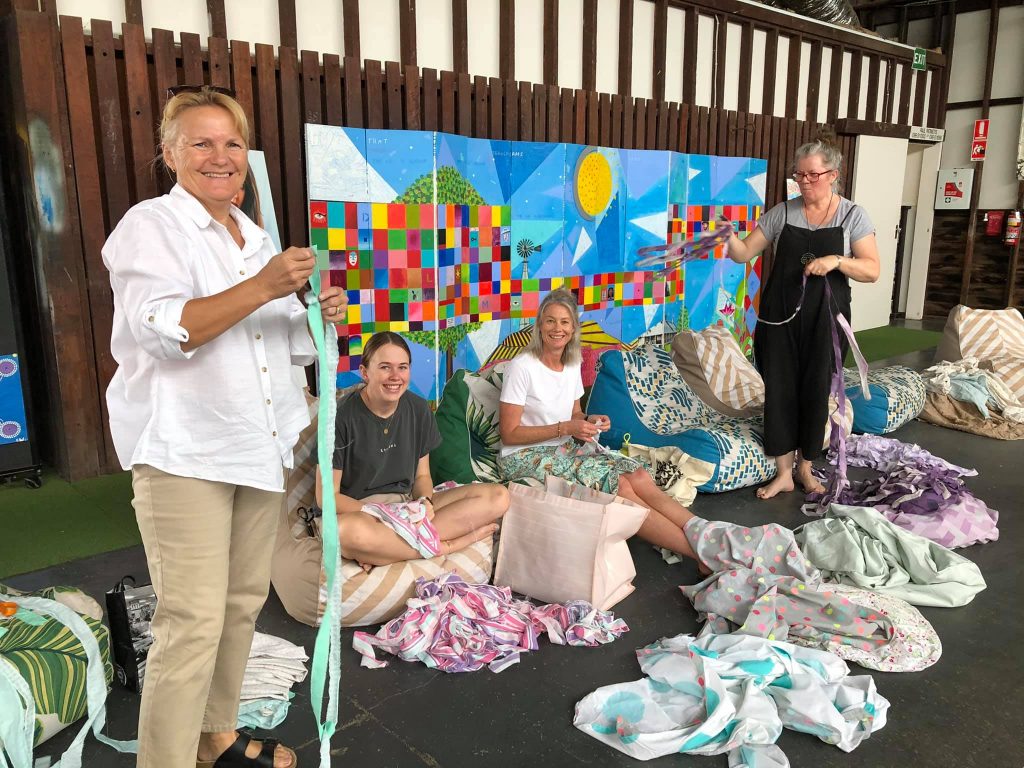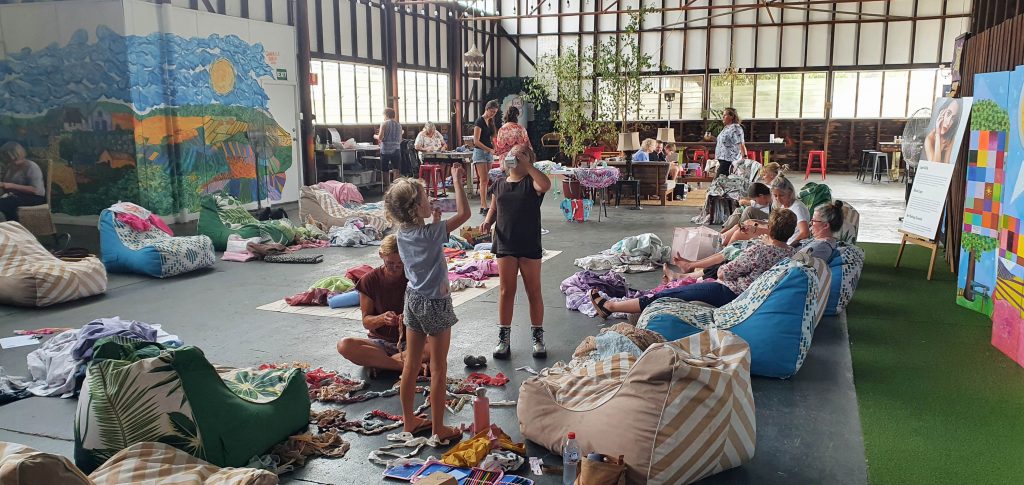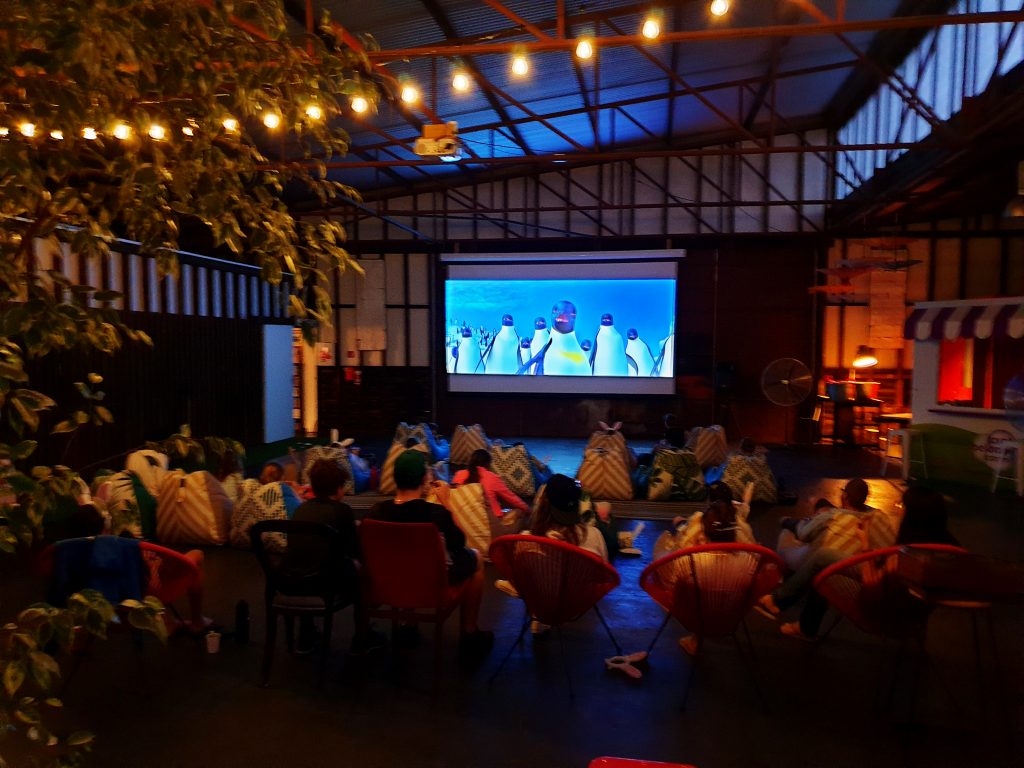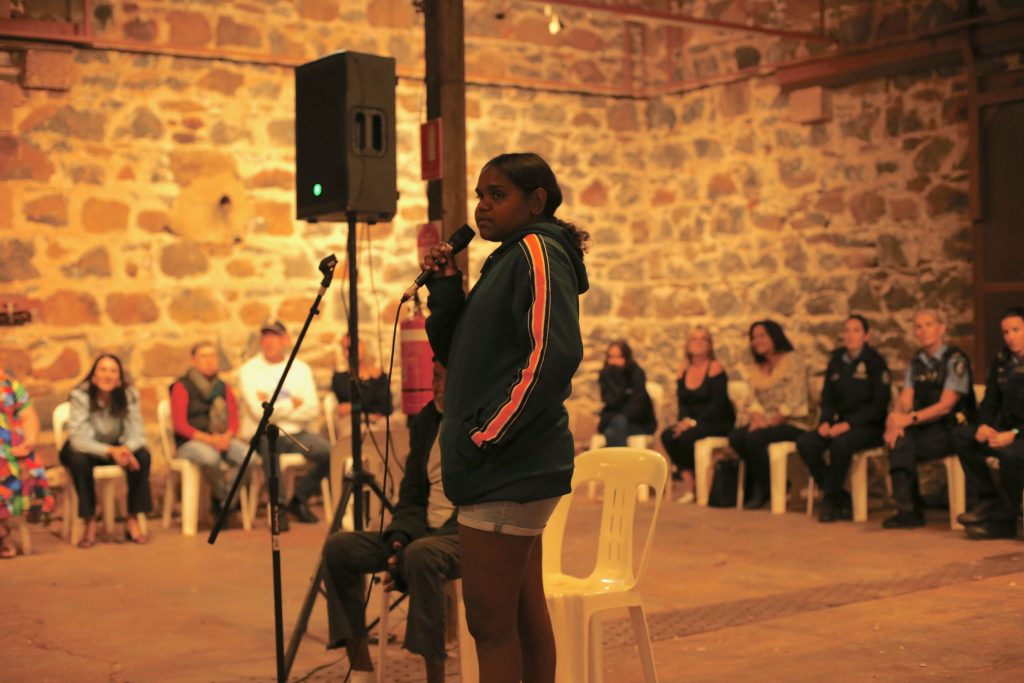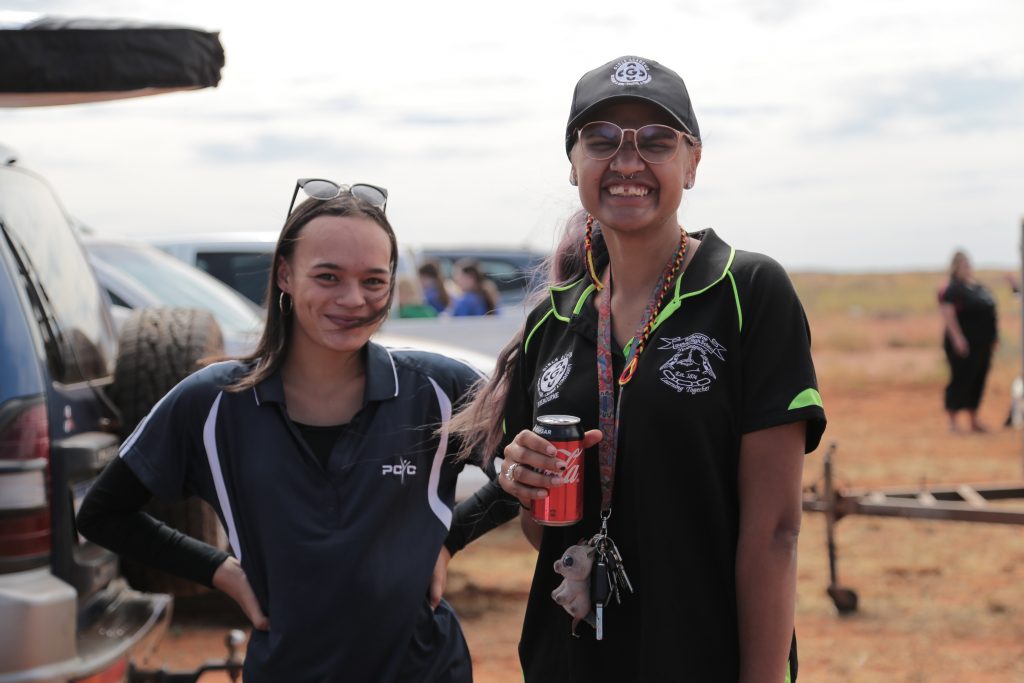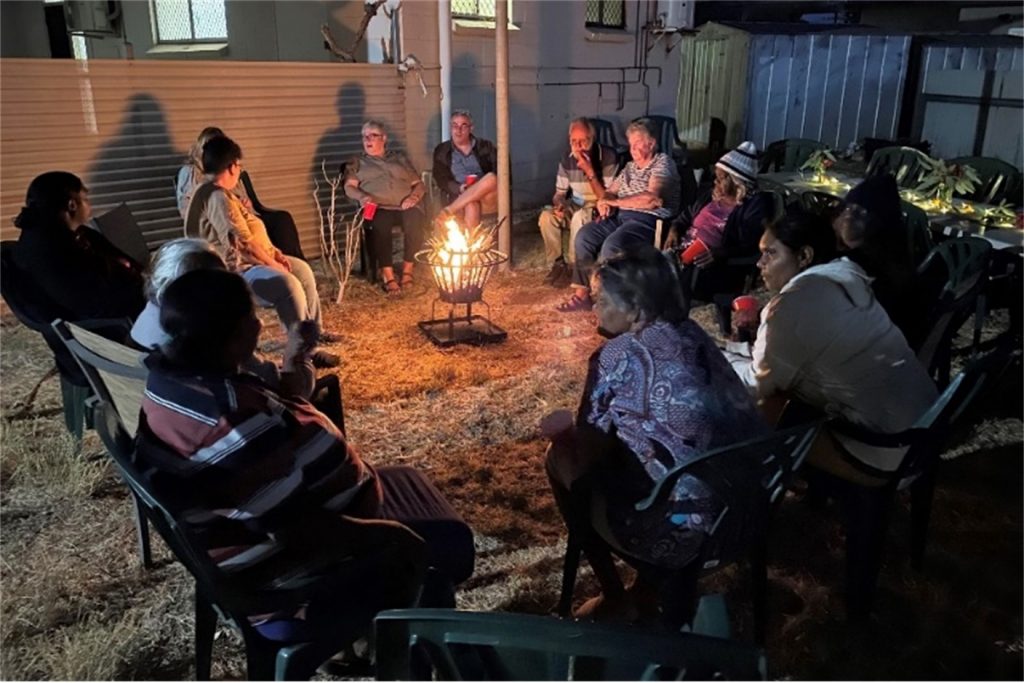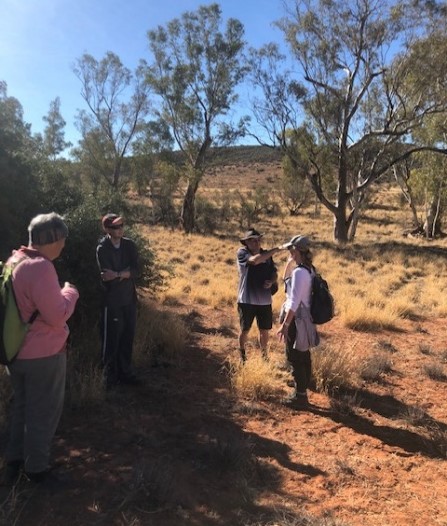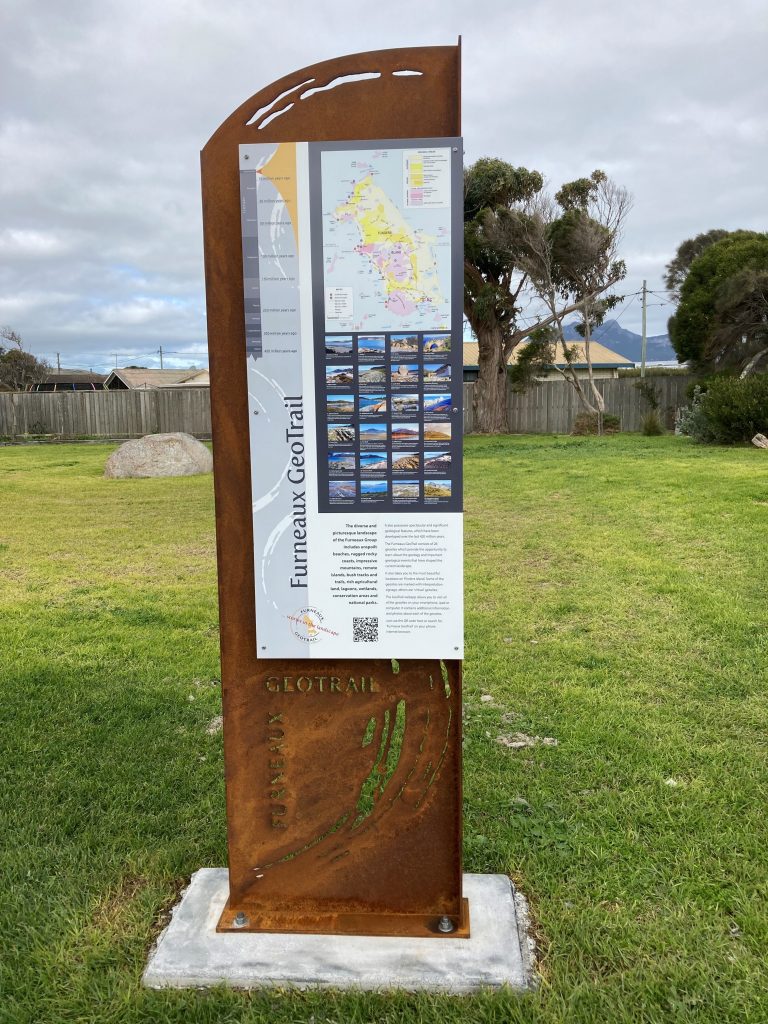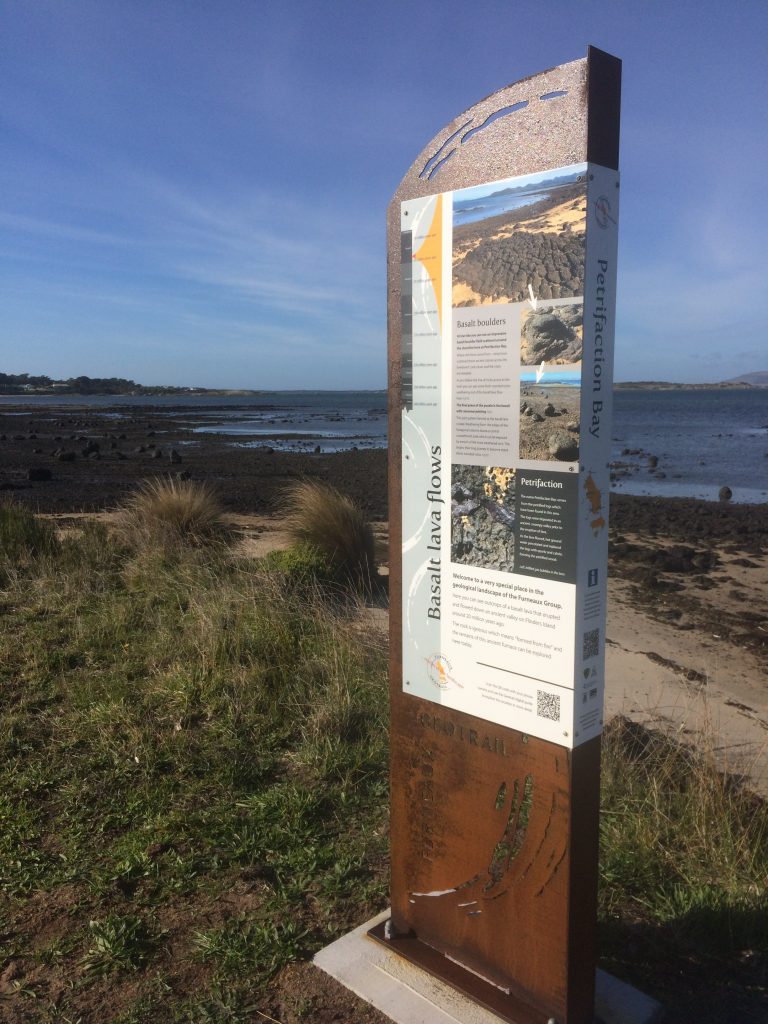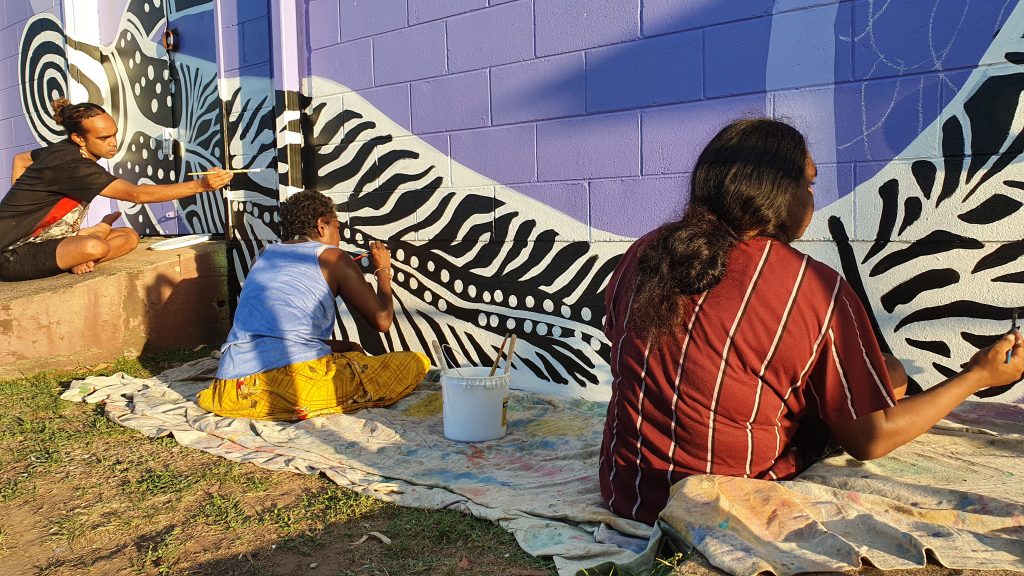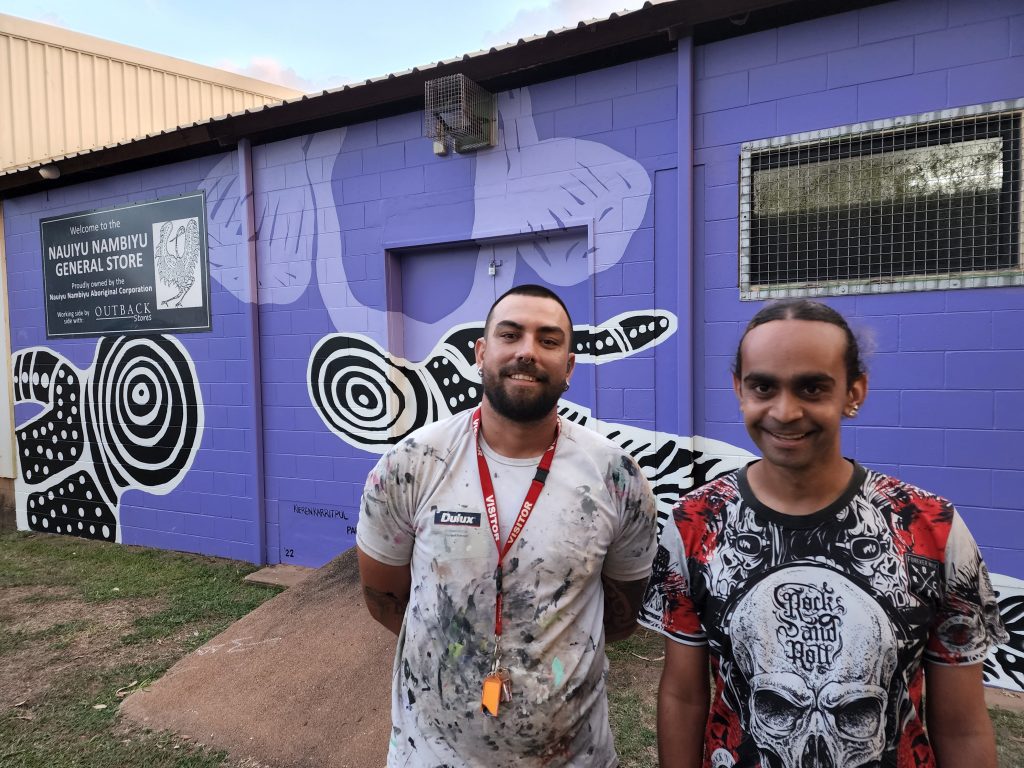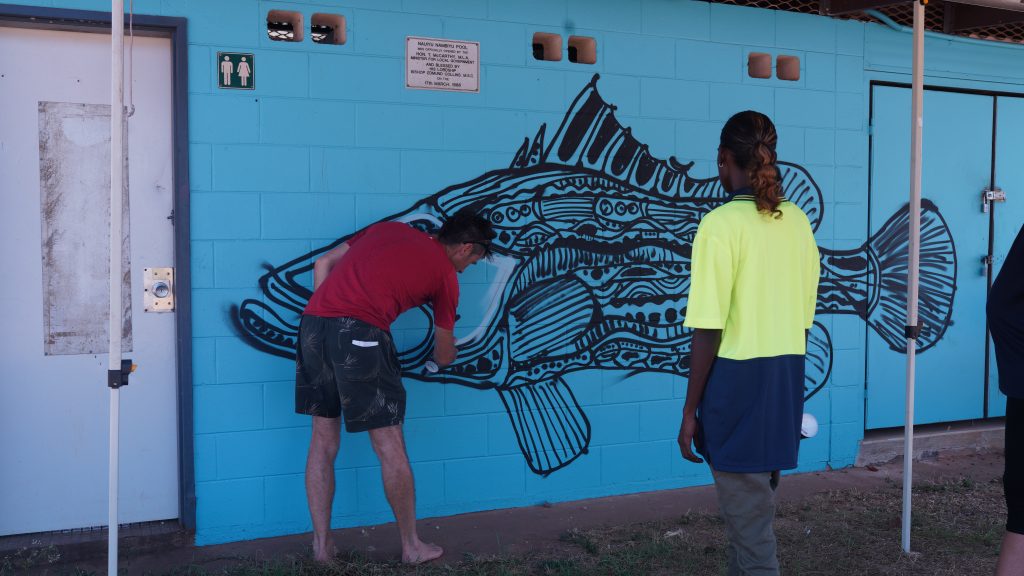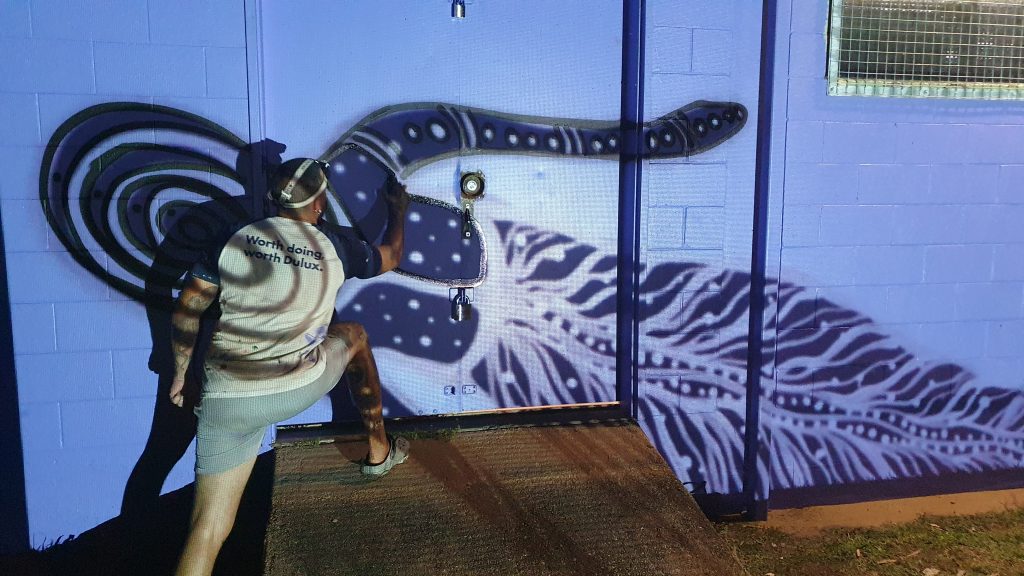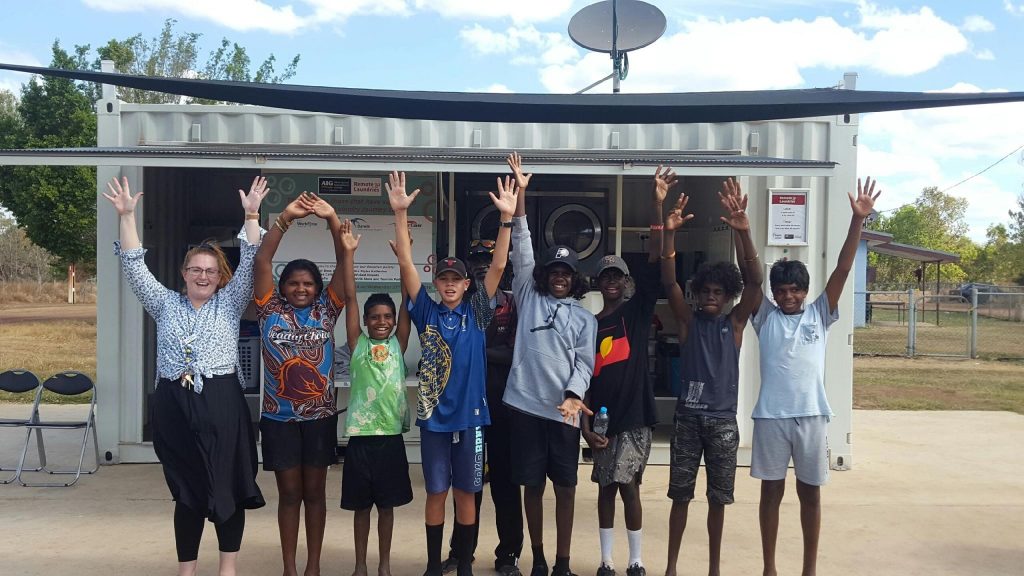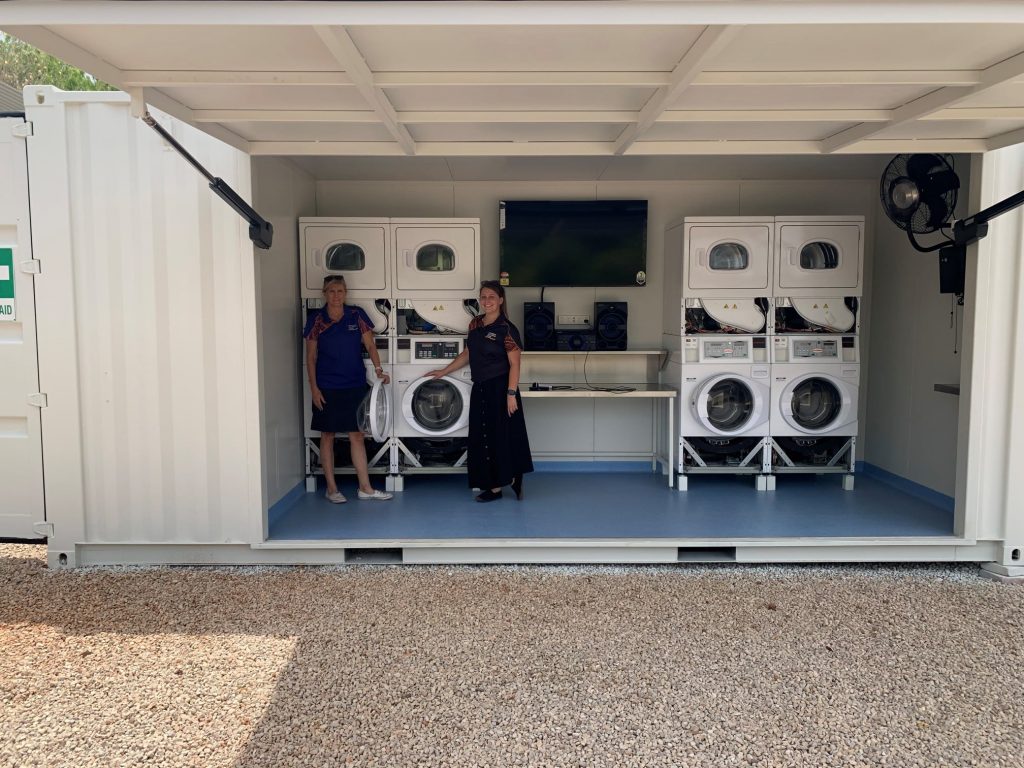Foundation for Rural & Regional Renewal (FRRR)
In this quarter’s update for FRRR’s donor partners, read about:
- Connecting with Communities
- Progress Report
- Insights from the bush
- Donor spotlight: Nutrien Ag Solutions
- Community partner spotlight: Housing Matters Action Group Inc (HMAG)
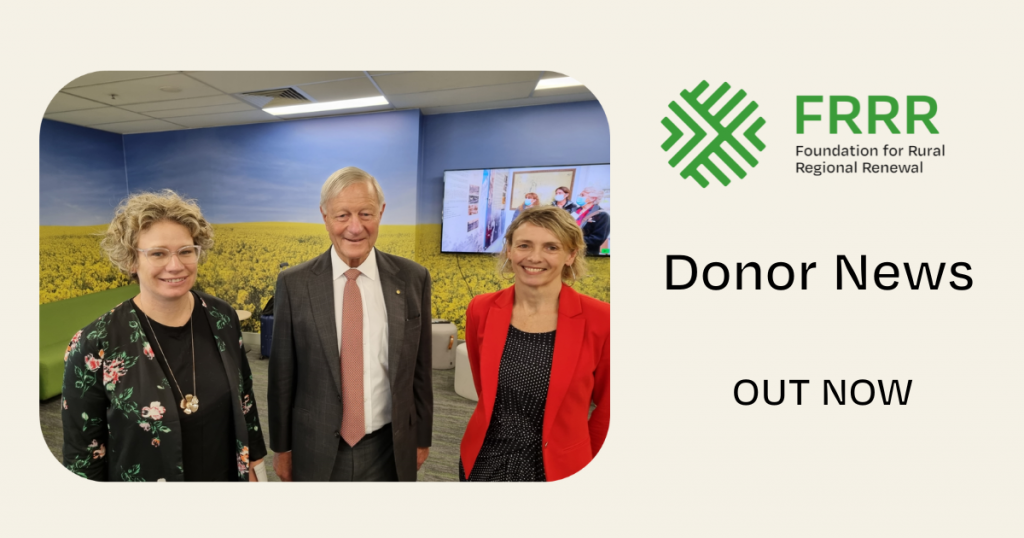
On Ngadju Country
Late 2019 / early 2020 saw 13 bushfires devastate approximately one million hectares of Ngadju country in southern WA, including large tracts of the Great Western Woodlands, the largest temperate woodland remaining on Earth. It is estimated that the extent of the area of Ngadju country impacted by the fires was equivalent to about half the size of Victoria. The bushfires burnt tracts of old growth forest, overran spiritual sites and destroyed the habitat and nests of threatened species.
Ngadju Conservation Aboriginal Corporation (NCAC) works with the Ngadju community to increase the understanding of conservation and land management opportunities and assist in building capacity to achieve them. Ngadju Rangers use cultural knowledge, refined over thousands of years, to care for the environment and work on Country to manage fire, feral animals and weeds, and to protect mijalkarru (rockholes), the Granites, water places and the flora and fauna of the Great Western Woodlands and the Nullarbor plains.
Following the fires, NCAC received a $25,000 Strengthening Rural Communities grant funded by IKEA Australia through FRRR to help the Ngadju Rangers to both repair the damage and undertake work to protect the environment and cultural sites from the devasting impact of the bushfires. Their approach involves a detailed program of cultural burning to protect sites, old growth and water trees. The mosaic effect of landscape-scale burning benefits biodiversity by reducing the extent and severity of large-scale fire and creates a range of vegetation growth stages and habitats that suit different species. Prior to a burn, Ngadju Rangers and Elders walk through the planned burn site to survey for cultural and environmental values. However, access to the tracks leading to these sites were heavily impacted by the recent fires and also from years of neglect.
NCAC used the grant to commission a specially fabricated trailer with hydraulic tipping for use with their tractor to help the Rangers clear the tracks, enabling safe access to undertake their important cultural and environmental work. This improved access will also allow other Ngadju community members to attend sites and undertake voluntary maintenance and management, which will help them reconnect with Country and transfer knowledge across generations.
Helen Langley, NCAC’s CEO, said that the project wasn’t without its challenges.
“The challenge was the amount of time it took for the trailer to be fabricated and then wired. It took eight months for the trailer to be built and we have only recently received delivery. We are developing Safe Operating Procedures and have organised training for the Rangers so that we can commence clearing tracks and making fire breaks around areas of mosaic burns.
“We are proud that the Ngadju Rangers can now access their Country for cultural burning and they can use machinery to make fire breaks. The project has assisted in rebuilding the Ngadju community and provided healing for community who are mourning the loss of Country.”
For more inspiring stories like this, head to our FY 2021/22 Annual Review.
On Yued, Amangu, Badymia and Widi Country
Carnamah is a town and farming community 300 km north of Perth in WA. Located on Carnamah’s main street, The Exchange is a repurposed heritage building that has been transformed into a multipurpose community and visitor centre. Run by North Midlands Project Inc, it is a not-for-profit arts, culture, history and heritage organisation working towards happy, healthy communities and vibrant, connected towns. They deliver activities across the North Midlands – the seven regional local government areas of Carnamah, Coorow, Mingenew, Morawa, Perenjori and Three Springs.
The Exchange is used on a weekly basis as the home of a local painting group, writing group, youth coding club and the regional Five Gums Scout Group. The space is also utilised for the delivery of many other community workshops and events facilitated by North Midlands Project – all of which are provided to the community free of charge to ensure they are accessible.
North Midlands Project received broad community feedback that people loved The Exchange, especially its welcoming vibe, but that it got too hot in the back section of the building during the warmer months. On occasion, Carnamah is the hottest place in WA, with summer temperatures averaging 36 degrees. This heat renders the space unusable for the best part of four months in the year.
The management committee received a $10,000 Strengthening Rural Communities grant, funded by Australia Post, to contribute to the cost of installing two large air conditioning units in the back section of The Exchange. This has transformed the space into one that is now utilised by the community for workshops, events and other activities right throughout the year.
David Bright, Executive Director of North Midlands Project, said that they are very happy with the outcome.
“Our many, many thanks to FRRR and Australia Post. The grant is enormously appreciated and will have an ongoing impact to our broader community.”
For more inspiring stories like this, head to our FY 2021/22 Annual Review.
On Ngarluma Country
Roebourne is a town in the Pilbara region of WA with a largely Aboriginal population. Police have observed a real gap in meaningful engagement with the youth of this community and a lack of opportunities to build their skills, confidence and positive decision making.
Big hART is an organisation that uses art as a catalyst for change. Over the years, Big hART has demonstrated its ability to engage and work strongly with young people and across different levels of community, with strong outcomes as a result. Their grassroots style of engagement, working directly with young people, has a huge impact on the social and community issues that face Roebourne as an Aboriginal community. The outcomes of the many programs, workshops and high production value events that have been created in partnership with Big hART have been profoundly life changing for many young people in the community.
Young people in the Pilbara have created a future focused, ground breaking digital education resource that celebrates living culture and supports teachers with an energetic mode of online learning. In 2020, Big hART received a $10,000 grant from the Westpac Foundation Community Grants program to train and create paid employment for four young adults in the Pilbara to deliver this Indigenous education resource live to classrooms nationally.
Known as the NEO-Learning project, Big hART created tailored training and professional development opportunities for the four trainees, who were individually mentored with a view to longer term employment, to deliver the NEO-Learning resource to schools nationally. The traineeships offered tangible career paths giving them strong digital skillsets and practical industry experience that included digital drawing and music delivery skill building, virtual education delivery, media and communications, and presenting and public speaking. These activities and tasks were mentored by professional producers and creative industry practitioners, through a task focused workshop program.
The outcomes from the project exceeded expectations, with incredible results for some of the trainees, one of whom was Simara, a young Aboriginal woman from Roebourne. She was part of the digital training program, and said that during the program, she grew in confidence and felt excited for her future and career path.
Sam Hawker is the National Producer for Big hART. She said that while creating peer to peer educational content, Simara displayed an excellent eye for framing and observation.
“We have been able to foster her passion for photography over the last 12 months, providing opportunity for Simara to build technical skills and refine her creative practice. To amplify her achievements, we delivered professional development workshops, leading to her art being selected at the prestigious Revealed Exhibition hosted by Fremantle Arts Centre in Perth. Big hART supported Simara throughout this process, from initial conversations with Fremantle Arts Centre to the development of an artist statement, workshops on licensing, contracts and payments. Over the course of the Exhibition, all of Simara’s artworks sold, including one being purchased by the WA State Government for display in Dumas House in Perth.
“As Simara’s confidence in photography continues to grow, she has become a very important role model and mentor for her peers and community.”
Simara also completed media training under the mentorship of Big hART’s Media Manager and implemented this training in conducting interviews with her community. Big hART also helped Simara to obtain her Driver’s License, an essential qualification for employment in the region.
“Being employed as a trainee with Big hART was a great experience for me, as I gained a lot from supporting children and being a mentor and leader for them… this work helped me learn my identity and aspirations. It has made me look for other challenges and opportunities in my life,” Simara said.
For more inspiring stories like this, head to our FY 2021/22 Annual Review.
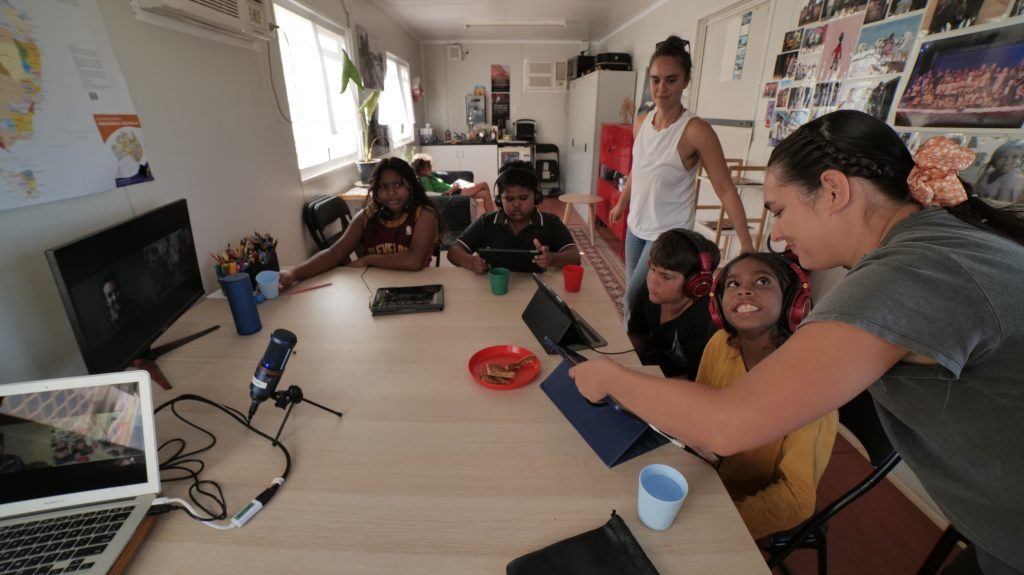
On Ngaiawang Country
The Morgan Volunteer Support Group is a not-for-profit organisation that delivers Meals on Wheels Monday to Friday including public holidays, for the Morgan, Cadell and Mount Mary areas in SA’s Riverland region. The Meals on Wheels service, which has run for more than 35 years, is invaluable for those requiring assistance to remain in their homes for as long as possible, as well as those who have problems such as a broken limb, drug rehab or failing eyesight, which diminish their ability to shop and cook. Additionally, Meals on Wheels delivery offers important social contact for people who use the service and may otherwise be socially isolated. This is of particular concern for those living in regional areas.
The Support Group has partnered with the local prison training program to cook the meals. This not only helps them gain skills for a future trade, but participants also gain satisfaction from helping the community.
In the past, the Morgan Meals on Wheels service used a car owned by Meals on Wheels SA. However, they wanted to sell the vehicle and instead have volunteers use their own cars. After some discussion, Meals on Wheels SA agreed to retain the vehicle for a further three years, to give the Morgan volunteers time to raise funds to acquire a vehicle of their own. Otherwise, the service would most likely cease.
This was also an opportunity to purchase a newer, more reliable, efficient and safe vehicle, as the car they were using was more than 10 years old. The Morgan Volunteer Support Group undertook a lot of local fundraising and secured a $10,000 grant through FRRR’s SRC program, thanks to the support of the Kellogg Australia Charitable Foundation. With COVID causing supply-chain issues, demand for second-hand vehicles was high but after much searching, they purchased a second-hand Toyota Camry Ateva. It met most other requirements – most importantly room for hot boxes, baskets and eskies.
In addition to using it for Meals on Wheels delivery, the group is also seeking to expand their delivery services. They also have plans to make the vehicle available at other times to offer transport solutions to the community, raising additional funds for the Support Group, at the same time as offering a valuable service for those who can’t drive or don’t own a car.
The group is rightly proud of what they achieved, on time and on budget.
“We had help from many different groups – Waikerie Men’s Shed, Waikerie Woolworths, Morgan Friendly Grocer, Morgan Roadhouse, Morgan Home Hardware, Morgan Commercial Hotel, Morgan Cadell Golf Club and hundreds of individuals.
“The car has been operational since March 2022 and is working well. We have been delivering meals for Meals on Wheels and for Morgan Activity Centre. Current customers can be assured of an ongoing service,” said Jakob Gamertsfelder, Secretary / Treasurer of the Morgan Volunteer Support Group.
For more inspiring stories like this, head to our FY 2021/22 Annual Review.
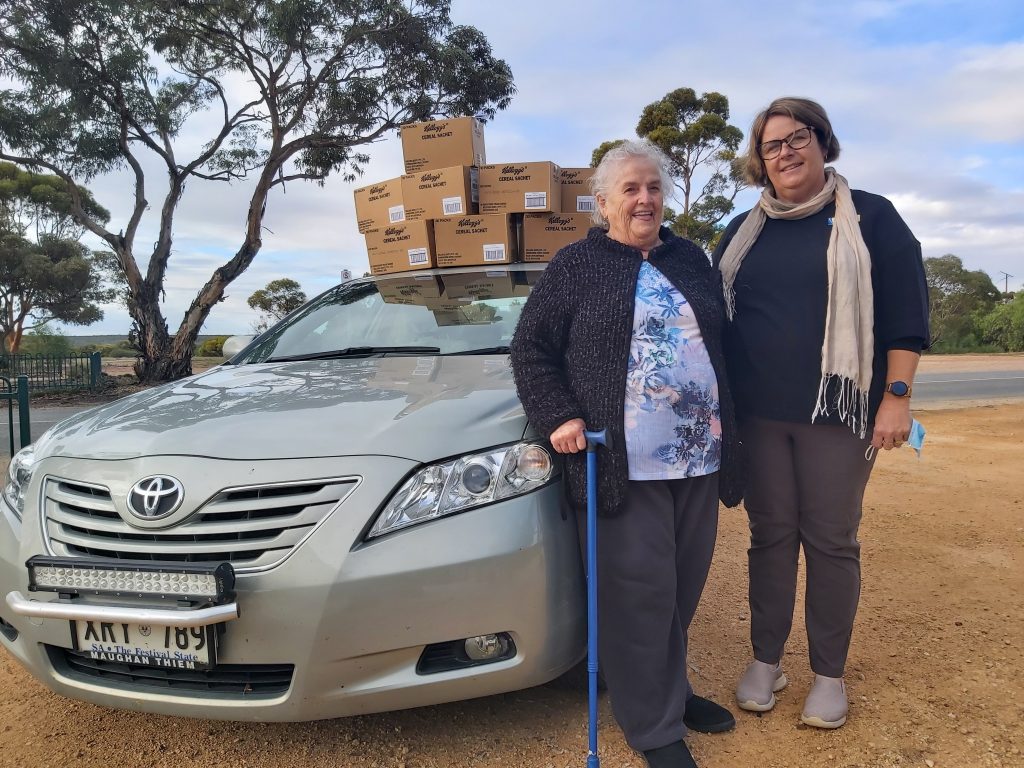
Eastern Arrernte Country
Ltyentye Apurte Catholic School (LACS) is one of the most successful remote Aboriginal schools in central Australia and the NT. It is the only school serving the 600-strong community of Ltyentye Apurte (pronounced ‘L-Ginga Porter’, which means ‘clump of beefwood trees’ in the Arrernte language) or Santa Teresa. A number of the facilities at LACS are communal, notably the library and computers. The community is 83 km south east of Alice Springs in semi-desert country. Temperatures are extreme, ranging from -1 to 45 degrees but there is year-round access via an unsealed road.
The local Arrernte people are bilingual and speak Eastern Arrernte and English (which is often their second or third language). The Arrernte language and cultural program is a key part of the curriculum at LACS.
In Santa Teresa, extreme socio-economic disadvantage is the norm, with residents and the school facing many challenges, notably extremely poor housing and health, high unemployment with minimal employment opportunities, adults suffering from poor mental health and a high number of students suffering from intergenerational trauma. Remote schools in general have a major issue with teacher retention due to the complex challenges of students and their families. The average stay of a teacher in NT schools is 7 months and 9 months in catholic schools. Existing senior staff frequently work 80 hour weeks regularly wearing multiple hats in part due to a lack of teachers.
According to the Principal at the time, to a great extent, the future of Santa Teresa depends on the school providing the optimum best education for Santa Teresa youth – “To make the remote community of Santa Teresa strong, we must make its school strong.”
There are currently 126 students on roll, from Pre-School to Year 11. They are all Indigenous and bilingual. Most of the teachers at LACS are non-Indigenous and come with a range of experience from mainstream education. The school is also a major employer of the local Arrernte people, with approximately 60% of Indigenous staff filling a multitude of critical support roles. Teachers work as members of a team in partnership with local Indigenous people and Arrernte assistant teachers and tutors.
Isolation and the challenges of living and working in a community context mean that staff need all the support they can get, in terms of building resilience. Ongoing change is the norm, with the last two years (2020/21) seeing significant change and uncertainty. There is often a significant turnover of new staff, which presents additional challenges to building trust and resilient community.
The impacts of these factors are significant, including very high levels of stress, distraction from the mission of educating students, lower engagement, uncertainty about the future, change fatigue, staff burnout, talent loss and lower trust in leaders.
To try to address this, the then Principal knew they needed to help teachers and staff build resilience, sustainable high performance and change agility. They used a $10,000 grant from FRRR, through the Strengthening Rural Communities program, funded by the Tim Fairfax Family Foundation, to run the Resilience Educators Program (REP).
The REP began with all teachers completing a Resilience Diagnostic, prior to a two-day workshop. The Diagnostic measured individual resilience in areas such as emotional regulation, self-confidence, compassion, exercise, sleep and nutrition. Staff then participated in a two-day workshop, facilitated by Paul Salmon, called “Thriving Through Change and Challenge”. Each staff member created three goals to help improve their resilience and the option of having an accountability buddy or sessions with a resilience coach to support them in reaching their goals.
After the workshop, the teachers were given access to an app, which provided a detailed resilience report and materials to develop new skills. They also committed to participating in a range of activities as groups of staff and the whole staff community, such as an evening walking group, weekend trips away and a regular BBQ breakfast. This was followed up with a visit from the Resilience coach, which led to three shared goals being created.
Despite challenges in rolling this out due to the pandemic and its subsequent impacts, staff collaborated to implement wellbeing activities based on their learnings from the workshops and the ongoing use of the Resilience App. They continue to come together as a community to support one another in challenging times.
The outcome has been an improvement on the health and wellbeing of the whole community.
“All staff became more aware of the importance of resilience and the necessity to plan for how to manage stress and cope with the added burden of the pandemic. There is also a greater understanding by leadership of the necessity to prioritise staff wellbeing through strategic planning using an integrated holistic approach.
“It has become part of our school culture for staff to check in with each other on how they are travelling, especially concerning sleep, exercise and levels of stress. It is now becoming part of our meetings to start with a partner check in or short meditation activity. We introduced a new wellbeing curriculum program, MindUp for Life, which not only teaches the knowledge and skills children need to regulate their stress and emotion but also supports teachers in building positive relationships with students and the broader community.
“There is a more holistic focus on wellbeing and resilience with an area created in the staffroom where staff relax and do mindful colouring. Plus, there are opportunities for staff to publicly acknowledge and show gratitude for effort, and pampering products for staff in our rest rooms,” said Pamela Brown, Acting Principal.
For more inspiring stories like this, head to our FY 2021/22 Annual Review.
The Furneaux Historical Research Association is located in Whitemark on Flinders Island in Tasmania. Founded in 1964, they’re a volunteer organisation responsible for the Furneaux Museum and the conservation of artefacts pertaining to the natural and cultural heritage of the Furneaux region.
The museum plays a significant role in the vitality of the small and remote isolated community, attracting more than 2,000 visitors each year. It’s also a popular gathering place for the community for exhibition openings and special events.
Thanks to the help of an FRRR grant of $24,924, funded by a private donor, through the Strengthening Rural Communities program, the Furneaux Historical Research Association was able to complete the second stage of the Furneaux GeoTrail project.
The Furneaux Group consists of more than 50 islands in Bass Strait, just north of Tasmania. Their rugged and picturesque landscapes contain impressive geological features developed more than 600 million years ago. Many visitors and locals marvel at the vistas in the remote region but before the GeoTrail project, very few people were aware of just how special the geology is.
The GeoTrail project is all about linking the people who live in and visit the Furneaux region to the landscape, educating them and providing them with information in an easy and accessible way.
Stage one of the project was rolled out in 2019 and consists of a self-drive experience made up of 10 interpretive signs in areas of geological significance, easily reached by road. The innovative trail includes a mobile app and is the only one of its kind in Australia.
Stage two of the project saw the extension of the GeoTrail out into areas of geological significance accessible by walking, biking, 4WD, sailing or kayaking. These more remote areas contain examples of unusual and striking rock formations, telling the story of how the islands originated and evolved.
The completed Furneaux GeoTrail offers a world class user experience across the island group that attracts new people to the area, engages those who use it directly, and allows local community and business entrepreneurs to use their creative energies and leverage the GeoTrail to seek out future opportunities.
“We are very proud of the fact that the GeoTrail is bringing our local community and those who visit Flinders Island closer to the geology and the environment around them. It’s so rewarding to hear people talking about rocks! We are also very proud of the huge amount of work done by our volunteers in completing the project.”
Dr Dale Williams, Project Manager
For more inspiring stories like this, head to our FY 2021/22 Annual Review.
Access to reliable, high quality mobile phone coverage is important for everyday activities. But it is critical when it comes to the lifesaving activities that the Freycinet Volunteer Marine Rescue Association undertake on a regular basis.
Based in Swansea on Tasmania’s east coast, the Association’s base is located on low lying Council land, which impacts the mobile phone signal from the local Telstra tower as it requires a direct line of sight for best coverage. The building is steel framed and clad, further blocking the already weak mobile signal. This meant members had to go outside of the building to obtain a mobile signal, which at best was two bars. Going outside to check the Bureau of Meteorology website prior to launching a rescue vessel involved waiting several minutes to access a signal and the important weather data.
COVID exacerbated the need for a mobile booster to provide stronger and more reliable mobile coverage as member training, which the Australia Maritime Safety Authority requires to be to the same standard as commercial mariners, had to move to Zoom sessions. Zoom provided additional benefits by allowing members the opportunity to remain connected and still have timely input into the Association’s activities.
Another challenge was that family members could not contact volunteers if they were inside the building. If there was an incident or accident while working within the building, there was also no way to make an emergency call without going outside – potentially leaving an injured member unattended.
A $2,244 grant from FRRR’s Strengthening Rural Communities program, funded by a private donor, supported the installation of the mobile booster. The project, described by the Association as ”one of our best projects in over 20 years of operation”, resolved all the issues of being able to access reliable, high quality mobile coverage in the Association’s building.
Results after installation showed 100% signal strength inside the building, providing a safety net for volunteers working on site and enhancing community safety, as information on emergency situations can now be accessed without delay.
For more inspiring stories like this, head to our FY 2021/22 Annual Review.
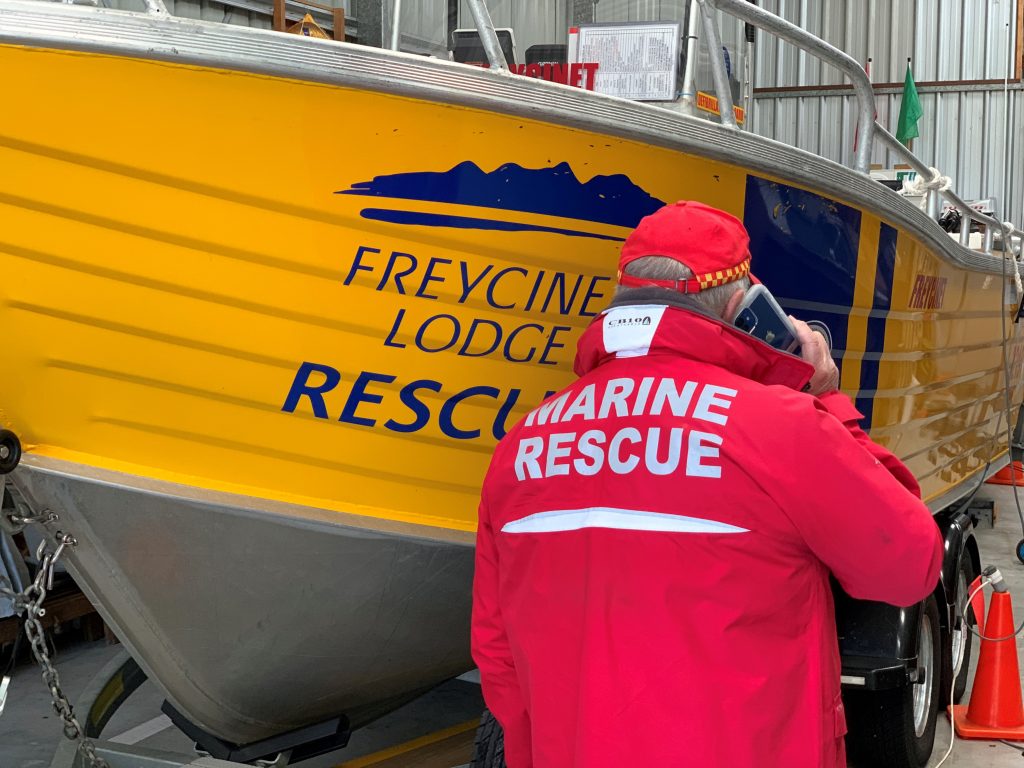
Malak Malak People
Nauiyu is an Aboriginal community of 444 people in the Daly River region in the Northern Territory. Their place, around 2.5 hours drive from Darwin, is said to be one of the best Barramundi fishing spots in the country, and locals hold a strong connection to their land and culture. Despite the idyllic description, Nauiyu experiences alcohol and other drug misuse within its small population. Yet there is strong community support for real solutions that respond to community needs, are culturally appropriate and involve building local capacity and furthering local leadership.
Enter Red Dust. Founded by John Van Groningen, the organisation was born out of his work with youth in the Aboriginal community of Lajamanu in 1984. Today, it delivers innovative health promotion and community development programs that are co-designed through trusted relationships with remote First Nations communities. For the people of Nauiyu, a community-based diversion program celebrating cultural identity and pride would provide a means to connect and engage the vulnerable community.
Consulting the community, Red Dust’s Local Drug Action team coordinated the Red Dust Community Art Collaboration project with local organisations. Green River Aboriginal Corporation identified sites for the murals; Merrepen Arts provided the connection to local artists and culturally relevant iconography; and Ironbark provided access to volunteers and project participants. Proper Creative, based in Darwin, was commissioned to paint the murals in conjunction with local project participants.
With collaboration between local artists, community members, young people, and service providers, and a $5,000 Strengthening Rural Communities grant funded by the Tim Fairfax Family Foundation & Pinnacle Charitable Foundation, Red Dust will deliver three large murals. The project will not only create beautiful public spaces and bring the dreaming of the Nauiyu community to life, it will also support the health, wellbeing and future opportunities for local youth.
While the mural project is ongoing, you can see the impressive first piece, featuring Daly River artist Kieren Karritpul. https://www.reddust.org.au/blog-posts/ldat-2022-05-nauiyu
For more inspiring stories like this, head to our FY 2021/22 Annual Review.
Yarralin Country
Can you imagine not being able to access a washing machine regularly? Sadly, that’s the reality for many people living in remote First Nation’s communities. Seven out of ten Aboriginal children living in these remote communities will contract scabies before their first birthday. Community homes are overcrowded, 59% do not have washing machines and only 38% of people living in communities wash their clothing and bed linen. This is largely because of a lack of access to power and a regular supply of detergent.
In addition to the health benefits, ready access to clean clothes removes barriers to job and school attendance, encourages community social inclusion and provides an enhanced sense of self pride and purpose.
The North Australian Aboriginal Charitable Trust (NAACT) is the charitable arm of Aboriginal Investment Group (AIG), a registered charity and a genuine not-for-profit entity. NAACT is dedicated to the improvement and regeneration of remote Aboriginal communities and the creation of sustainable employment opportunities for Aboriginal people.
NAACT’s goal is to provide every Aboriginal person the opportunity to have clean clothes and a disease-free home.
That’s where the Remote Laundries Project comes in. It delivers fully automated, custom-built, commercial standard, fit-for-purpose laundries in remote Northern Territory Aboriginal community locations. The washing and drying cycles are provided at no cost, with detergent and chemical grade sanitiser automatically injected into the wash-cycle. Each laundry program site generates five sustainable meaningful positions, is 100% locally staffed and operates 38 hours per week across six days. The laundries allow every sector of the community to access clothes and bedding washing facilities, which increases quality of life by breaking community cycles of disease and sickness common in remote Aboriginal communities. This delivers clear tangible health, social and economic benefits.
It’s an innovative business model – a social enterprise – driven by Aboriginal people. Robust community consultation gives voice to those who will benefit from the project including Traditional Owners. AIG works in conjunction with the relevant on-site Aboriginal Corporation and is directed by this collaboration with Traditional Owners for all significant decisions about development and delivery.
While the majority of this project, valued at $742,000, comes from the Aboriginals Benefit Account, NAACT originally approached FRRR for a grant of $10,000 to go toward the cost of the machines. However, COVID delayed the whole project, including the release of other funding. The project managers and community representatives were keen to ensure that the machines were ready to go when restrictions lifted and other funding was released. The grant was funded, thanks to the support of the Tim Fairfax Family Foundation, through the Strengthening Rural Communities program. NAACT applied for a variation of the original grant agreement, which allowed them to use the grant as a deposit to purchase the washing machine in advance of the Yarralin Remote Laundries Project’s commencement.
In their grant acquittal, Brittany Ciupka, Project Officer, said that FRRR was exceptional, quick to respond and flexible.
“We greatly appreciate FRRR allowing us to secure the machines while we finalised ABA negotiations. This will save large amounts of lead time as the machines ship from the USA. We are excited to forge ahead as soon as ABA gives us the green light and we will keep FRRR in the loop with project updates.”
While the laundry in Yarralin is not yet operational, there are four similar laundries already operating successfully in other remote communities, so FRRR looks forward to continuing to monitor the impact of this this innovative project. It should not only reduce disease but create jobs and income, leading Indigenous people to self-reliance. This in turn will lead to a more engaged, participating community and a stronger sense of place.
For more inspiring stories like this, head to our FY 2021/22 Annual Review.

